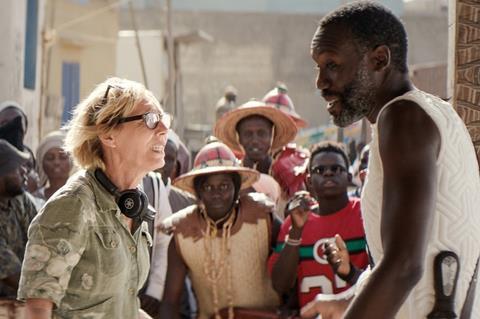The writer/director’s latest revolves around a fictional film version of Medea being made in West Africa

Dir/scr: Ulrich Kohler. Germany/France. 2025. 91mins
Questions of race, class and post-colonial neuroses are explored intriguingly in Gavagai – an irony-tinged drama woven around the troubled location shoot and festival premiere of a Franco-German movie filmed in Senegal, based on the Greek myth of Medea. Ulrich Kohler’s first solo feature since In My Room, which premiered in Cannes’ Un Certain Regard section in 2018, Gavagai is refreshingly grown-up in the way it sets up satirical targets and then complicates them – pointing out, for example, that tensions around caste, exclusion of the ‘other’ and the guilt of privilege are not the exclusive preserves of white people.
Wears all its symbolic and intellectual baggage lightly
Premiering in New York before playing Zurich and Hamburg, this is a film for thinking audiences – and patient ones too, as it is a good 20 minutes before the film’s sly, watchful humour begins to bite. But as alternative, limited-run programming to broader issue dramas like Luca Guadagnino’s After the Hunt, Kohler’s return to feature filmmaking certainly has legs.
In a way, Gavagai resembles some of the satirical narratives of US writer Percival Everett, which focus on issues of race and identity – one of which became the film American Fiction. In his novella For Her Dark Skin, Everett himself took a wry critical look at the myth of Medea, as reclaimed and made a metaphor for the black experience by authors like W. E. B. Du Bois.
Kohler gives the rejig of the legend another twist by imagining the Medea of the film within this film as a white woman who is looked down on as a pariah in the black kingdom of Jason of Corinth, whose children she bore. Staged as a stiff parable, its tone, set design and costumes hovering somewhere between Julie Taymor’s stage Lion King and Pier Paolo Pasolini’s own version of Medea with Maria Callas, Gavagai’s embedded Medea movie is a good example of the subtle audience games Kohler is playing. At first it seems laughable, like a student drama class Afrofuturist exercise, but gradually it builds power and meshes with Gavagai’s wider themes.
Gavagai wears all its symbolic and intellectual baggage lightly in a story that is pegged on the affair between Maren Egert’s Maja – the German actress who plays Medea – and her co-star Nourou (the Jason of the embedded film), played absorbingly, and with quiet authority, by Jean-Christophe Folly. Done fairly straight, taking in two steamy lovemaking scenes, this central story is less interesting in itself than as a rack upon which to hang revealing incidents.
The first of these comes right at the start, when the Medea film’s French director Caroline (Nathalie Richard) loses it during a fraught shooting day on a Senegalese beach. In order to make amends, she finds herself bending over backwards to show the local crew, cast and extras that she is not just another white colonial despot. The second occurs when the action moves to Berlin, where the film is premiering, and involves a security guard who asks Nourou for his ID outside the luxury hotel where the cast and crew are staying. Is the white guard racially profiling this black actor? Maja certainly thinks so. (The way white people get angry on behalf of black people is part of Gavagai’s satirical tapestry).
The security guard turns out to be Polish. “In Germany, that’s like being black”, he tells Nourou in a tense final-act scene. Nourou himself grew up in Paris, and comes from a well-off Senegalese background. At a press conference following the Medea film’s Berlinale premiere, Caroline is assailed by questions about cultural appropriation. “Maybe we can talk about the film now?”, she eventually suggests. Another hostile question follows.
There’s a surreal visual flourish at the end of this scene, but its best part is less flashy: the opening view of the panel and roomful of journalists through the glass of the interpreters’ booths. In the lag between the question or reply and its translation, Kohler suggests, lies a world of potential mis-interpretation. Viewers curious enough to Google the word ‘Gavagai’ will discover that it derives from a story that philosopher Willard Quine invented to illustrate the fact that our attempts to translate from one language or culture are always going to be guesses, at best.
The director and his regular DoP Patrick Orth depict Senegal as a place of colour and continual movement, at least on the outside. Berlin, in contrast, is drab and grey, all concrete blocks and windswept plazas. Music is sparing, but perfectly tailored to Gavagai’s uneasy mood; its subtle, disorienting shifts between comedy and drama; its alternation between Nourou and Maja’s point of view. One recurring theme is a rejected piece that experimental composer Morton Feldman wrote for the 1961 cult film Something Wild. With its queasy, see-saw rhythm and off-pitch notes, it’s the perfect accompaniment to the tonal and thematic balancing act of Kohler’s nuanced satirical drama.
Production companies: Sutor Kolonko, Good Fortune Films
International sales: Luxbox, festivals@luxboxfilms.com
Producers: Ingmar Trost, Clement Dubion
Production design: Reinhild Blaschke, Oumar Sall
Editing: Lorna Hoefler Steffen
Cinematography: Patrick Orth
Main cast: Jean-Christophe Folly, Maren Eggert, Nathalie Richard, Anna Diakhere Thiandoum, Mateusz Malecki, Roch Peton, Misel Maticevic















![[L-R]: Amanda Villavieja, Laia Casanovas, Yasmina Praderas](https://d1nslcd7m2225b.cloudfront.net/Pictures/274x183/6/4/1/1471641_pxl_20251224_103354743_618426_crop.jpg)








